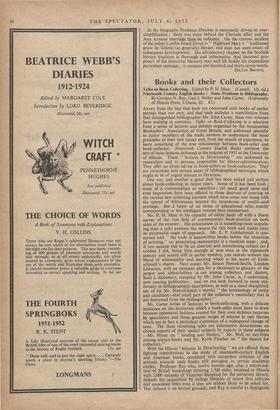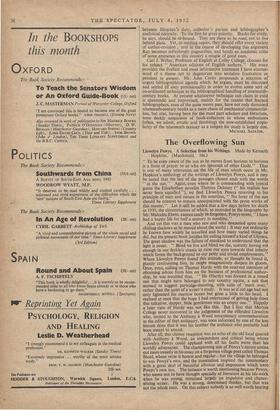Books and their Collectors
Talks on Book-Collecting. Edited by P. H. Muir. (Cassell. 12s. 6d.) Nineteenth Century English Books : Some Problems in Bibliography. By Gordon N. Ray, Carl J. Weber and John Carter. (University of Illinois Press, Urbana, Ill. $3.)
APART from the fact that both are concerned with books of earlier periods than our own, and that each includes a contribution from that distinguished bibliographer Mr. John Carter, these two volumes have nothing in common. Talks on Book-Collecting is a selection from a series of lectures and debates organised by the Antiquarian Booksellers' Association of Great Britain, and addressed specially to junior members of the trade, anxious to understand the basic principles of their new career and, from the mouth of experience, to learn something of the true relationship between book-seller and book-collector. Nineteenth Century English Books contains the text of three lectures delivered in the autumn of 1951 at the University of Illinois. These " lectures in librarianship " are addressed to researchers and to persons responsible for library-administration. They offer no direct advice to book-sellers or book-collectors. They are excursions into certain areas of bibliographical technique which ought to be of urgent interest to librarians.
One way and another a good deal has been talked and written about book-collecting in recent years. Some of it has been bosh ; some of it commonplace or repetitive ; yet much good sense and even inspiration, have been offered to those desirous of catering to the various new collecting interests which have come into being with the spread of bibliomania beyond the boundaries of wealth.,and privilege. But .I know of no series of educational talks exactly corresponding to the intelligent venture here summarised.
Mr. P. H. Muir in his capacity of editor leads off with a fluent survey of the vast field of contemporary book-practice on both sides of the counter. His exhortation (it is something more inspirit- ing than a talk) presents the reason for this book and makes clear its purposeful angle of approach. Mr. E. P. Goldschmidt is con- cerned with " the trade in handwritten books before the invention of printing," i.e. preprinting manuscripts in a monkish sense ; and, if you assume this to be an abstruse and intimidating subject (as I confess I did, being little enough at ease even in the eighteenth century and scared stiff in earlier epochs), you reckon without the blend of whimsicality and learning which is the secret of Gold- schmidt's charm. Next comes Mr. Simon Nowell-Smith, London Librarian, with an eloquent plea for a dictionary or glossary of the jargon and abbreviations in use among collectors and dealers. Such a dictionary, compiled by Mr. John Carter, is, I understand, now nearing publication ; and we can look forward to some uni- formity in bibliographical descriptions, as well as a more disciplined use of (in Mr. Nowell-Smith's words) " the terminology of rarity and condition—that small part of the collector's vocabulary that is not borrowed from the bibliographer."
Mr. Carter writes of fashions in book-collecting, with a delicate
insistence on the distinction which a book-seller must learn to draw between ephemeral fashions created for their own dubious purposes by speculators and those genuine surges of interest in new themes which are in fact a periodical expression of a widespread change of taste. The three remaining talks are informative dissertations on chosen aspects of their special subjects by experts in those subjects —Mr. Nixon on " binding and binders," Mr. Weil on key-titles among science-books and Mr. Kyrie Fletcher on " the theatre for collectors."
With the Illinois "lectures in librarianship " we are offered three fighting contributions to the study. of nineteenth-century English and American books, combined with outspoken criticism of the attitude towards such books still prevalent , in certain academic circles. Professor Ray who, twelve months ago, after a whirlwind- tour or British bookshops covering 3,500 miles, returned to Illinois with 5,000 volumes of Victorian literature for the university library, defends the acquisition by college libraries of minor first editions and associated titles even if they are seldom likely to be asked for. between librarian's duty, collector's purism and bibliographer's analytical curiosity. To the first he gives priority. Books for study, he says, should be re-bound. They are there to be read, not to live behind glass. Yet, as reading copies, they should offer every variety of author-revision ; and in the course of developing this argument Ray becomes refreshingly pugnacibus, and hands an academic critic of some eminence in this country a couple of good ones.
Carl J. Weber; Professor of English at Colby College, chooses for his subject " American editions of English authors." His essay provides the liveliest and most informative treatment I have encoun- tered of a theme apt to degenerate into tentative frustration or petulant tit quoque. Mr. John Carter propounds a selection of urgent bibliographical agenda which, he argues, must be discussed and settled (if only provisionally) in order to evolve some sort of co-ordinated technique in the bibliographical handling of nineteenth- century books. At present whatsoever technique can claim to exist is spasmodic and improvised, mainly for the reason that learned bibliographers, even of the quite recent past, have not only dismissed nineteenth-century books as a mere chaos of mechanical commercial- ism, but also, having been for the most part' scholars and librarians, were darkly suspicious of book-collectors to whose enthusiasm (often, we admit, erratic and fumbling) the now-established popu- larity of the nineteenth century as a subject for study is largely due.
MICHAEL SADLEIR.



























































 Previous page
Previous page